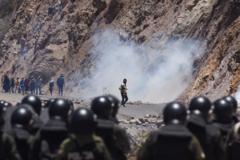In response to the takeover, the Bolivian military urged the armed group to dismantle their blockade and appealed to the captors to release the soldiers, labeling the seizure an act of treason. Images circulated in local media show soldiers with their hands behind their backs, highlighting the gravity of the situation. The military initiated evacuations for personnel and their families from the area amid escalating risks.
Over the past 19 days, bolstered by military actions and backed by tensions between Morales' supporters and current President Luis Arce's faction, blockades have disrupted the country. Evo Morales, a controversial figure in Bolivian politics, has recently claimed that his car was shot at, suggesting an assassination attempt, a claim that the government has vehemently denied.
The political arena in Bolivia remains fractious as both Morales and Arce prepare for the upcoming presidential election in 2025, further complicating the country’s already volatile situation.
The issues surrounding these events are part of a broader national narrative, as Bolivia grapples with deep divisions stemming from past electoral disputes and differing political ideologies. As the situation unfolds, the potential consequences for civil order and governance in Bolivia remain uncertain.
Over the past 19 days, bolstered by military actions and backed by tensions between Morales' supporters and current President Luis Arce's faction, blockades have disrupted the country. Evo Morales, a controversial figure in Bolivian politics, has recently claimed that his car was shot at, suggesting an assassination attempt, a claim that the government has vehemently denied.
The political arena in Bolivia remains fractious as both Morales and Arce prepare for the upcoming presidential election in 2025, further complicating the country’s already volatile situation.
The issues surrounding these events are part of a broader national narrative, as Bolivia grapples with deep divisions stemming from past electoral disputes and differing political ideologies. As the situation unfolds, the potential consequences for civil order and governance in Bolivia remain uncertain.




















